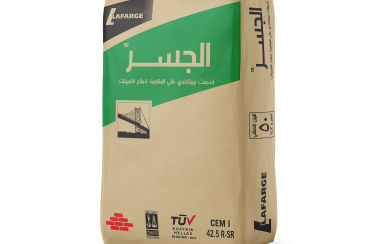AL-JESR
ِ
AL JESR
Type V
CEM 1 42.5SR
High Sulfae resistance Cement
Al Jesr is a specialty cement product, manufactured according to the European Standard EN
197-1:2011.
Al Jesr is a type of Portland cement with limited amount of C3A (maximum of 3.5 ) it complies with Iraqi standard IQS 5-1984 type V.
Application:
- Concrete foundations and structures that are in direct contact with soil and groundwater which contain sulfates.
- Concrete sewage lines and wastewater treatment installations.
- Dams and mass concrete.
- Marine concrete.
Standard:
High Sulphate Resistant Portland Cement:
- According to EN 197-1:201 1.CEM 1 42.5R-SR.
- According to Iraqis Standard No: 5/1984 type V.
Properties:
Special sulfate-resisting properties for use in all conditions prone to sulfate attack:
- Minimizes the risk of Alkali-silica reaction.
- Lower heat of hydration versus ordinary Portland cement.
| Applications |

|

|

|

|
| Infrastructure and Foundation Work | 1 | 3.5 | 2.5 | 1 |
This guidance is only in the case where the mix design is not specified by the project consultant.
Defined water quantities may change according to ambient temperature and humidity, aggregates absorption and clay content.
Usage & general recommendations:
All concrete ingredients (cement, aggregates, mixing water & admixtures) should comply with the relevant standards. Local (or international) concrete codes should be referred to, and appropriate design parameters (eg. cement type, minimum cement content, maximum WIC ratio and concrete strength class) must be selected depending on the requirements of the application, and according to international standards. Avoid casting concrete in temperatures less than 5 oc and above 35 oc.
Water:
In general, the more water is used for a given quantity of cement, the more porous and thus the weaker the concrete will be. It is therefore important to use the minimum amount of water required to make the mix workable, in order to obtain a strong and durable hardened concrete.
Make sure to use clean water for mixing, watering and spraying.
Mixing:
It is recommended to mix the constituents in a fully automated batching plant. For non-automated concrete production (hand mixing or mixing by portable mixers), accurate measurement of all ingredients with a suitable container (wheelbarrow or bucket) is essential. Materials should be mixed until a uniform color is obtained. Adding too much water should be avoided.
Curing:
Concrete or plaster should be watered for a period no less than 3 days to prevent cracking and to ensure strength development. In hot weather, concrete or plaster should be watered for 7 days. Following the placement, horizontal concrete surfaces should be sprayed gently with water, be cured by pulverized agents or protected with plastic (or wet hessian) sheets in order to prevent drying shrinkage and water evaporation.
Availability:
Available in bulk, 50kg bags or 1.5 ton jumbo bags throughout Iraq.
Storage:
- Bagged cement should be stored on raised platforms and be protected from adverse atmospheric conditions.
- 50 kg bags should not be stored in more than ten vertical rows.
- Bulk cement should be stored in damp-proof silos.
Health and Safety:
Cement and concrete in general may cause skin irritation. During any application, wearing gloves and eye glasses is highly recommended. In case cement touches the eyes or bare skin, the area should be thoroughly rinsed with free flowing water and medical assistance be provided when necessary.
Technical Support:
Further information, advice on this product and the full range of Lafarge cement products can be obtained through the contacts listed below:
- Call Center: 07713454545
- E-mail: 4545@lafarge.com






